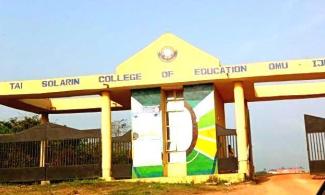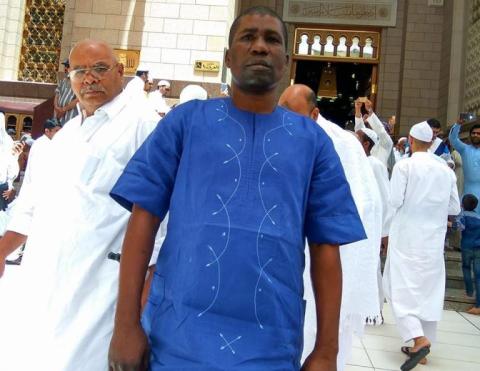

THE Nigerian government customarily situates institutions of higher learning in rural communities in order that they may serve as catalysts for development. Tai Solarin College of Education, TASCE, is no exception. Established in 1978, the Ogun State College of Education is located in Omu-Ijebu, 10 kilometres southwest from Ijebu-Ode.
The college was separated from the Tai Solarin University of Education, Ijagun, in October 2008, and was relocated to a new campus. Since the move, Omu-Ijebu, a somewhat remote community, has started developing, though slowly. But, the same cannot be said of the college itself.
The Act establishing Tai Solarin College of Education provides for the inauguration of Governing Council, but since its disarticulation over a decade ago, this provision has not been upheld by the state governor, who is empowered to appoint the chairman and most members of the council.
The council is meant to be the supreme administrative authority, relate the interests of the staff to the state government, and be responsible for the general management of the college’s affairs and control of its finances and properties.
It is also the Council’s function to determine college fees, appoint staff, and “regulate the salaries and determine the conditions of service of all staff of the College”.
Though Amosun has only three months left to complete his second tenure, he has not paid any visits to the campus.
The government has not provided the school with facilities, buildings, and general infrastructure needed to ensure its smooth running. The school has a total of 17 buildings.
The administration of former governor Gbenga Daniel built two of them: the college hall, lecture rooms, a mini hall, and offices.
Other structures have been put in place either through support from philanthropists or the Tertiary Education Trust Fund (TETFund).
The college library, for example, was funded using a 2015/2016 merged maintenance intervention fund from the federal agency. The structure housing the School of Education was built using merged normal intervention funds for 2011 to 2013. Also, a 250-seater auditorium is presently under construction and is paid for using merged intervention funds for the years between 2014 and 2016.
“Since Senator Ibikunle Amosun became governor, he has never done any project here,” says Daniel Aborisade, chairman of the Coalition of TASCE Staff Unions.
“He has never come to our aid in any form,” he adds.
“We need more offices. We need more lecture rooms, we need more laboratories, and other things. So we want him to really act as our proprietor and do something on this campus.”
This claim is substantiated by Bankole Oluwasegun, another senior college lecturer. “All the buildings you are seeing here are being funded by TETFund,” he says.

These are not the only problems arising from inadequate resources and neglect from government. Convocation ceremonies have also not been held in the past 10 years; students are simply graduated and certified yearly without any rite of passage.
Aborisade laments that previous proposals written to the state governor for assistance with graduation ceremonies were not approved.
Similar requests made for help in getting accredited by the National Commission for Colleges of Education and in establishing an affiliation programme with the Olabisi Onabanjo University, OOU, were also not granted.
The college’s medical centre, like other institutions, has equally suffered great inattention. Funds are not regularly provided by the management for its upkeep and it has taken the resilience of clinic workers to keep it running for basic drug administration.
The clinic occupies a three-room bungalow initially meant to serve as a kitchen for a student hostel. None of the rooms, as a result, have cross-ventilation.
“If you go there now to see the beds, we have only six or seven beds in the whole school,” reveals Mutolib Abdullah, a doctor working as one of the college’s healthcare providers.
The Ogun State government ranks very low in terms of transparency and public access to information. It is among 17 states in the country ranked least on the Public and Private Development Centre’s 2018 Open State Government Ranking—performing poorly on indices about citizens’ access to budget and contract information and having failed to sign up for the Open Government Partnership.
Its 2013 budget proposal, however, shows that N556 million was proposed for TASCE for recurrent expenditures and N140 million for capital expenditures. It is not clear what percentage of the monies were eventually approved and released to the college.

What happened to the college’s IGR?
In the face of declining financial assistance from the top two tiers of government, Nigeria’s tertiary institutions have had to increasingly fall back on options for generating revenue internally. Those in Ogun State make use of their IGR not just to fund capital projects but in complementing government subventions for recurrent expenses such as payment of salaries. For OOU, this was confirmed to our reporter by the registrar, Femi Ogunwomoju.
Kola Abiola, chairman of the Academic Staff Union of Polytechnic (ASUP) at Moshood Abiola Polytechnic (MAPOLY), Abeokuta, said the polytechnic, like TASCE, has not been generating sufficient IGR to pay staff’s salaries.
“At the end of this February, the government will be owing staff four months’ salary, 17 months of pension that has been deducted but not been remitted, about 15 or 16 months’ union dues that have not been remitted. I cannot say we are different from Tai Solarin College of Education,” he adds.
“I don’t know where you want the institution to generate IGR. Can the IGR pay the salaries of all the staff? Even the stipend the government is meant to pay, they don’t give it to them. So what do you want to augment with it?”
However, because it started on a fresh slate after its renewed independence and relocation to a new campus in 2008, the situation at TASCE is much worse.
It was estimated that the college generated only N150 million in 2013, compared to OOU’s N2.6 billion, Tai Solarin University of Education’s N1.5 billion, and Moshood Abiola Polytechnic’s N1.3 billion.
“Others are not shouting the way we are shouting because they have many students that can bring IGR, and they use the IGR to augment their salaries,” Aborisade discloses.
“So tactically, most higher institutions in Ogun State are glorified private institutions. OOU, TASUED, MAPOLY are admitting many students into certificate, diploma, higher diploma and other degrees. The universities have postgraduate programmes and they charge something substantial; so it is this money they gather.”
The union chairman observes that other schools in the state charge exorbitant fees as acceptance fees and tuition levies and, because of their large student population, they are able to use this for salary payment.
OOU has an estimated population of 30,000 and gets revenue also from annual dues from alumni, public donations, agricultural products, hostels, commercial ventures, laboratory services and so on. For the 2018/2019 academic session, the acceptance fee required by the school was N60,000, while its school fees ranged between N72,000 and N179,000. TASUED has close to 20,000 students, and MAPOLY has roughly 25,000.
As a way of pushing up the college’s IGR, a degree programme was started in May 2018, in affiliation with Olabisi Onabanjo University. A structure on campus meant for use as a student hostel has been converted for the purpose, and through the programme, a lot more students have been admitted and higher revenue is made from student levies.

Allegations of mismanagement, ‘reckless spending’
In September 2016, when Lukman Adeola Kiadese was set to assume office as the new provost of Tai Solarin College of Education, workers of the college resisted, insisting on the payment of at least two-thirds of the arrears owed. Kiadese, at a general congress held with them, appealed for cooperation and promised to resume the payment of full salaries within six months. But this is yet to happen.
Meanwhile, the provost has been severally accused of mismanaging funds belonging to the college, particularly in connivance with the acting bursar, Gbenga Olusanya. Though IGR is expected to have naturally increased over the years, staff members complain that they have not seen improvements in developments on campus or in staff welfare.
While the former administration of Abiodun Ojo paid up to seven months of net salary arrears, Kiadese has only paid arrears for one month.
“And we know he is having more money than the other administration had,” says Aborisade.
“How has he spent that money? What has he been using the money for, we want to know. Those are the questions we are asking. Like I told you the other time that other institutions are using IGR to augment their salary. Why is he not doing that?”
He adds: “Of recent, we stumbled on documents that show us that he is just wasting our money on unofficial things, on things that do not even concern the college… money they are supposed to pack together and pay one or two backlogs or use to augment what the government is paying, but he is not interested in that.”
Copies of these documents, payment vouchers from the college’s bursary, were obtained by our reporter. The vouchers are stamped and signed by the school’s internal auditor and head, Salary and Wages Department. According to two of such vouchers, on January 9, 2019, the sum of N315,000 was approved for release to Akinola Ademola and Adedayo Temidayo, from the provost’s office and Centre for Degree Programme, for an official trip to the University of Ilorin two days earlier.
According to another voucher dated December 28, 2018, the sum of N67,500 was released to Amuludun Tosin of the bursary department for the “additional purchase of rice and turkey for the members of the House of Assembly for end of the year gift”.
Also between December and January, N50,000 was approved for the payment of security officials regarding “ongoing staff agitation and restiveness within college community”, N100,000 was approved “for National COEASU [College of Education Academic Staff Union] Executive visit to the college”, and N40,000 was approved for the transportation of Akinola “from Ijebu-Ode to Abeokuta” — a distance of 74 kilometres.
[slideshow]68113[/slideshow]
In a petition to the Economic and Financial Crimes Commission dated January 30, 2019, the college’s union also alleges that Kiadese has lately released the sums of N350,000, N300,000 and N320,000 respectively to Tosin Amuludun, ‘Mrs. Banjo’ and ‘Mrs. Adebambo (Ipaye)’, all workers at bursary department, for their personal use.
The provost is also accused of making illegal payments to college’s former provost and registrar, and failing to remit staff’s pension deductions.
“Adeola Kiadese and Mr. Gbenga Olusanya connived to pay the sum of N600,000 each to Dr. Abiodun Ojo and Mr. Tunji Kanimodo, former Provost and former Registrar of the college respectively, monthly for close to one and a half years, claiming it is meant for sabbatical that was not observed,” the petition claims.
“The Provost and Ag. Bursar failed to remit pension deduction as and when due to staff retirement savings accounts. They also did not remit the government quota of our pension to our accounts in contravention of Pension Reform Act of the Federal Republic of Nigeria 2004 (as amended).”
In 2017, the petition continues, there was a TETFund-sponsored trip to the United Arab Emirates and the provost and acting bursar allegedly took out the names of certain college lecturers who were originally scheduled to travel. The names were replaced with those of Modupe Mujota, former Commissioner for Education Science and Technology of Ogun State; Olakunle Oluomo, Deputy Speaker of the Ogun State House of Assembly; the Permanent Secretary of the state Ministry of Education Science and Technology; among others from the ministry and state legislature.
“They were all sponsored illegally from TETFund’s account, paid some amounts ranging from N300,000 to N500,000 each and few college staff members who went with them and were paid the same amount were compelled to pay the money into Mr. Temidayo Adedayo’s FCMB account for no reason,” the letter adds.
“We urge you to thoroughly investigate the legality of the trip and the financial transactions that followed. Also we pray that you investigate whether it is proper for the Provost and the Ag. Bursar to compel staff of the college that could not attend TETFund sponsored conferences to pay back the fund collected to a special account not known to TETFund.”
Mujota, in a phone interview with The ICIR, however described the accusation as absolutely false, “in my estimation”, adding that she has never been to the UAE.
“I don’t know why anyone would suggest that he took me to the UAE. I am well-travelled, seasonally so. I travel very frequently and I have travelled to most of the continents of the world. But I have never had the pleasure to go the United Arab Emirates, so I don’t know why anybody would suggest as much,” she tells our reporter.
But two of the lecturers who were part of the trip, under the condition of anonymity, insisted otherwise and confirmed they were instructed to refund money given to them by the management.
Provost avoids interviews
When our reporter called for his reaction to the allegations, Kiadese repeatedly said he is not willing to comment “for now”. He also said The ICIR should not bother sending him a text.
“I will let you know. I will save your number,” he replies to the question of when he should be contacted again.
At a later time, he asked our reporter to travel to meet him in Ogun State. But when this instruction was followed and he was informed, he ended the call and did not answer subsequent calls to his phone. His phone was switched off the following day.
The college’s bursar also declined to comment on the allegations.
“I don’t have any comment because I am not aware of all what you are saying,” he responds after the reporter shared with him some of the workers’ allegation. He instead ended the call abruptly.
Calls placed to the state governor were not answered at the time of filing this report. The Secretary to the State Government, who was involved in a road accident on Friday, February 22, said he regrets he could not attend to official requests as he was out of town. He directed our reporter to “please speak to people in the Ministry of Information” but calls placed to Adedayo Adeneye, the state’s commissioner for information, were not answered. He also did not reply a text message sent to him.
Olaniyi Oladunni of Gboyinde Chambers, the lawyer who assisted in drafting the letter and is offering professional help to the coalition, confirms that the petition was also submitted to the Independent Corrupt Practices Commission (ICPC). He is expecting a positive outcome from the commissions’ independent investigations, and if the presented facts are found to be true, he adds, “they are very strong grounds for prosecution if need be”.
Time ticks on a new promise
Following the National Labour Congress’s planned but shelved protest in Abeokuta, the state governor promised to make amends respecting workers’ welfare, including those at TASCE.
“The governor has magnanimously asked that the sacked NLC chairman be reinstated and all other issues, including payment of outstanding gratuity, contributory pension scheme and Tai Solarin College of Education subventions have been amicably resolved,” said the NLC president, Ayuba Wabba.
Amosun himself told the union members and journalists he would clear all backlogs before he hands over to the next governor.
“I will not owe any worker any of their entitlement before I leave office,” he assured.
Come May 29, it will be clear if the governor’s statement on March 4 is another hollow promise or not.